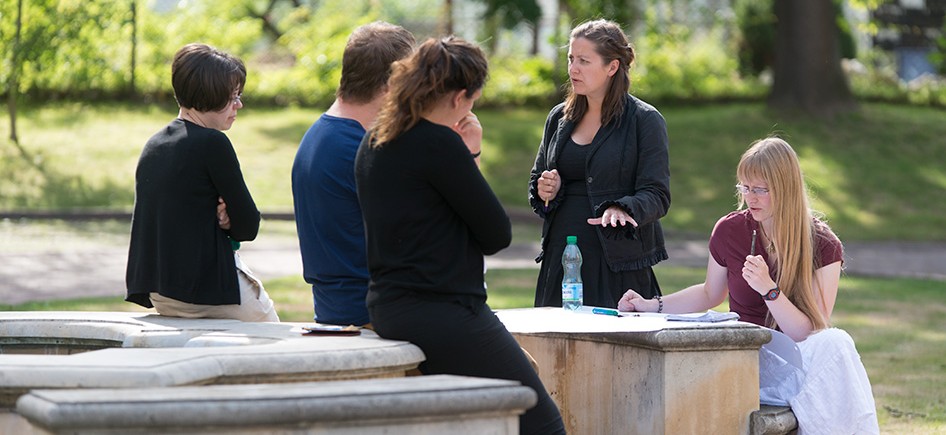
Messages, values and needs
The participants were taught on this day the importance of messages: such as lectures, books and speeches have a very clear message in the end, so should also cultural projects. Łucja Piekarska-Duraj wanted the participants to think about their personal heroes they named the day before: “What motto, what message could they have to transmit?“ Some of the mottos the group members came up with were “Don't be a fool“ (referring to August Landmesser who rejected the Hitlergruß in 1936), “No pain, no game“ (referring to Andrássy Gyula, Hungarian statesman and insurgent against Habsburg), “Culture needs equality“ (referring to Shushanik Khurginyan, an influencial Armenian feminist writer).
The subsequent task was to outline the common values that lay behind the named mottos and to add further values deemed important. The resulting list contained amongst others the values of freedom, truth, responsibility, morality, hard working, commitment, creativity, talent and love. “In every cultural project, there have to be backround values! Łucja Piekarska-Duraj stressed. She explained, there should be the message – which needs to be affirmative. What matters on top of this are needs, as Łucja Piekarska-Duraj pointed out: “Presenting an idea, you have to mention needs“.
Keep in mind the “windmill story“
Łucja Piekarska-Duraj presented the youtube video “How I built a windmill“ – an interview Willaim Kamkawamba from Malawia gave at TED in 2007. About a project – the building of a windmill to power a few electrical appliances in Kamkawamba's family's house – which is so simple and so incredibly impressive due to the whole story. Kamkawambar in the age of 14 with using blue gum trees, bicycle parts and materials collected in a local scrapyard managed to built an electricity-producing windmill. By reference to this imposing example, the group outlined the key elements of a good project: a need, an idea, a decision, research, ressources, tools, a test.
Besides this, the example of William Kamkawamba the tutor underlined. “If you are creative, you can always find some kind of ressources!“
Ressources!
The participants were supposed to think about their own ressources in the realm of knowledge and expertize, had to define their skills. “Use the ressources of yourself and of others!“– this is a general demand for projects Łucja Piekarska-Duraj made the participants aware of. The participants did “speed dating“ in pairs to get to know what are the skills and the expertise of their counterpart. Afterwards, everyone presented his “dating partner“ to the group regarding his skills and knowledge, promoting him or her as a potential project partner. An estimation of the presentations followed and advices were given what could be made better.
Four values – four cultural projects
The participants were divided into four groups whereby every group had to come up with a cultural project devoted to one of the highest-ranking values – truth, love, freedom and responsibility. In this session, the groups could proceed only so far to brainstorm and shortly present some ideas regarding their chosen value. Last task was to think about possible formats of cultural projects: not only exhibitions, concerts, debates, workshops or documentaries can be taken into account, but also games, video blocks, marathons, art installations, social experiments and more.
by Jill-Francis Käthliz













